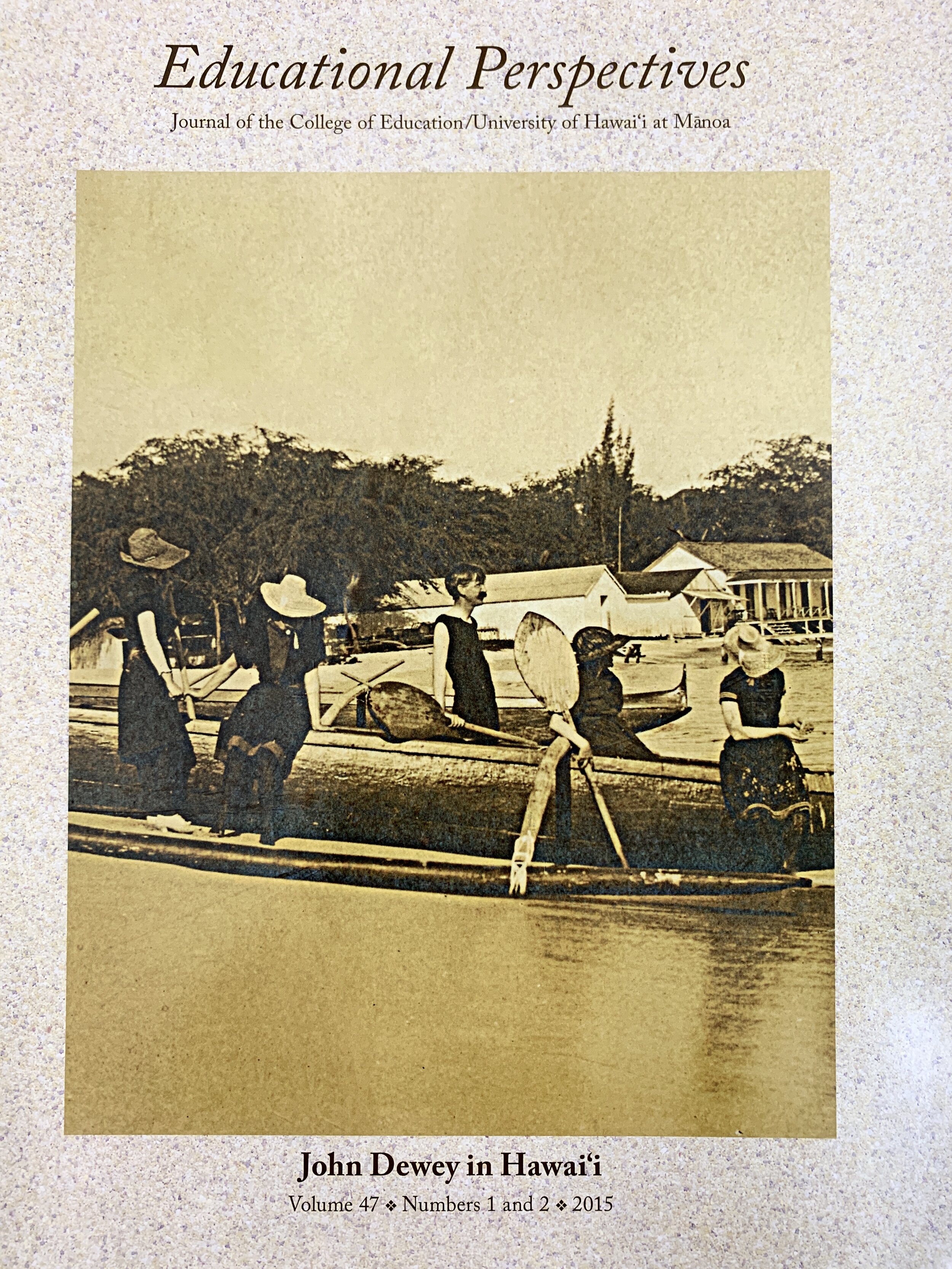By Amber Strong Makaiau, Chad Miller, and Sasha Himeno-Price
Education in the post COVID-19 pandemic period has the potential to dramatically shift societies globally and create lasting positive change: increased climate consciousness, a more ethical integration of technology within the human experience, increased care for the social emotional well-being of individuals and communities, and more socially just forms of democratic governance. In the words of progressive era philosopher John Dewey (1916), “as societ[ies] become more enlightened, [they] realize that [they are] responsible not to transmit and conserve the whole of [their] existing achievements, but only such as make for a better future society. The school is its chief agency for the accomplishment of this end” (p. 20). Now is the time for educators and society at-large to reflect on what we want to take with us from pre COVID-19 life, what pandemic era innovations we want to carry forward, and what aspects of collective living no longer serve us. This pathway towards a better future society is at the heart of the progressive education movement, and is the reason why progressive educators, institutions, pedagogies, and practices are needed now more than ever.
This summer, the University of Hawaiʻi at Mānoa’s (UHM) College of Education (COE) will launch the brand new MEd-CS Progressive Philosophy and Pedagogy track to further develop educators’ collective capacity for creating a better future society through the work they do with children, schools, and the communities that they serve. The first of its kind in the nation, this innovative 30-credit graduate program is designed for educators and scholars from diverse disciplines and contexts. Found only at the UHM, this program is grounded in Hawai‘i’s long and rich progressive education movement and is built upon the UHM COE’’s partnerships with a number of local schools and organizations, who are bringing the theories and practices of early progressive educators into the twenty-first century. Program partners include:
Experiences in the program are framed around an initial series of face-to-face summer seminars, distance learning, and a two-week immersive field experience so program participants can continuously apply what they are learning to their home schools and contexts. Grounded in an “intellectually safe philosophical community of inquiry” learning model, participants wrestle with real-world problems first hand, critically examine the progressive education movement and its relevance to Hawai‘i, and collaborate to carry forward the larger project of social justice. At the program’s completion, participants submit a portfolio that demonstrates individual and collective progress around the program’s core values of: experience, inquiry, dialogue, action, and reflection. In addition to earning a Masters in Curriculum Studies, program completers will also earn a UHM COE Philosophy for Children Hawai‘i Endorsed Certificate.
In future blog entries we look forward to sharing the voices and work of the UHM COE Progressive Philosophy and Pedagogy program’s first cohort. Additionally, we will include insights gained from program texts, resources, and experiences. In the meantime, subscribe to the Progressive Philosophy & Pedagogy Blog on the blog’s main page here to be the first to know when new posts are added.
ABOUT THE AUTHORS:
Dr. Amber Strong Makaiau is a Specialist at the University of Hawaiʻi at Mānoa, Director of Curriculum and Research at the Uehiro Academy for Philosophy and Ethics in Education, Director of the Hanahau’oli School Professional Development Center, and Co-Director of the Progressive Philosophy and Pedagogy MEd Interdisciplinary Education, Curriculum Studies program. A former Hawai‘i State Department of Education high school social studies teacher, her work in education is focused around promoting a more just and equitable democracy for today’s children. Dr. Makaiau lives in Honolulu where she enjoys spending time in the ocean with her husband and two children.
Dr. Chad Miller is the 2012 Hawaiʻi Teacher of the Year, a National Board Certified teacher, and is currently a Specialist at the University of Hawaiʻi at Mānoa’s College of Education. Dr. Miller also serves as the Director of Teacher Development at the University’s Uehiro Academy for Philosophy and Ethics in Education and is the Co-Director of both the Progressive Philosophy and Pedagogy and National Board Certification Teacher Leader Curriculum Studies MEd programs. He also serves as a “Philosopher in Residence” at several public schools, where he supports K-12 teachers as they incorporate the activity of philosophy into their classroom practice. Dr. Miller and his ‘ohana live in Honolulu and love listening to punk rock, watching sports, and, most of all, being at the beach.
Sasha Himeno-Price is currently a Masters of Public Policy candidate at the Heller School of Social Policy and Management at Brandeis University. Her focus is in Child and Family policy, specifically education policy and increasing access to high-quality education. Outside of classes, Sasha enjoys spending time with her friends and family and walking Biskit, her recently adopted dog from the Humane Society.
Works Cited:
Dewey, J. (1916). Democracy and education: An introduction to the philosophy of education. New York: MacMillan.






